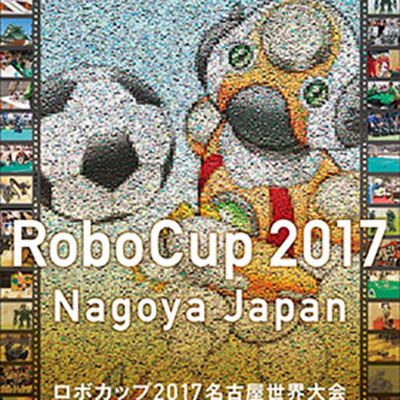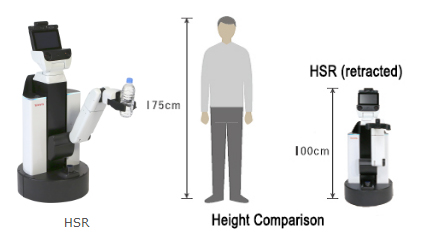

competitions, which included
RoboCup@Home
It was the first time a team from UC San Diego's Contextual Robotics Institute competed head-on with top robot builders around the world at the international RoboCup@Home competition in Japan. A team of computer scientists from the institute and CSE failed to make the top three (the only U.S. institution to make the top three was the University of Texas at Austin, which placed #3 in the same category).
The competition ran from July 27 to 31 in Nagoya, and members of the UC San Diego team spent the previous three months refining and testing algorithms to train Toyota's Human Support Robot (HSR) to complete two tasks: picking up and putting away groceries; and helping someone to carry groceries from their car to their home. The students were part of the research groups of CSE professors Laurel Riek and Henrik Christensen. (Christensen is also director of the Contextual Robotics Institute.)
The RoboCup@Home competition tests a robot's ability to perform everyday tasks, help people around the house and establish naturalistic robot-human communication and interaction. The teams were also tested on their ability to control robotic arms to manipulate objects; and the use of a wide range of sensors for voice interaction and image recognition. "This is a great competition because it challenges researchers to think about the practicalities of deploying robots in real-world environments, like people's homes," said professor Riek. "In a very short time, our students have accomplished remarkable work, and we are really proud of them."

Robot (HSR), pictured here at full height (far left)
and retracted (far right).
The Tritons-SPL team faced off against 10 teams, including UT Austin and Northeastern University. In addition to UT Austin's #3 finish, the top performers in UC San Diego's category were: #1-ranked Hibikino-Musashi@Home SPL, a team fielded by Kyushu Institute of Technology; and #2-ranked eR@sers, a team including members from Tamagawa University and from Japan's National Institute of Informatics, and the National Institute of Information and Communications Technology.
All teams used Toyota's HSR robot. The robot is designed to assist people with daily tasks. It's compact and light weight, and equipped with an articulated arm and flexible hand as well as a telescoping body. The robot can be programmed and trained to fetch and carry objects, recognize and interact with people, and perform household tasks.
The UC San Diego team was made up of CSE Ph.D. students Angelique Taylor, Darren Chan, Priyam Parashar, Ruffin White and Jaskaran Virdi. Taylor and Chan are members of the Healthcare Robotics Lab, led by Riek, which focuses on human-robot teaming research in safety-critical environments, such as hospitals, homes and factories. They design learning algorithms for robots which can understand people, and are currently focused on applications in critical care and neurorehabilitation. Riek leads multiple projects supported by the National Science Foundation, Air Force Office of Scientific Research, and industry, which focus on new computational methods for human-robot teaming.
Ph.D. students Parashar and White are members of the Cognitive Robotics Lab, led by Christensen, with a focus on systems integration, human-robot interaction, mapping and robot vision. The ultimate goal is to build robots that empower people in their daily lives.
Read a preview of the robotics competition on the Jacobs School of Engineering website.
RoboCup@Home Domestic Standard Platform

